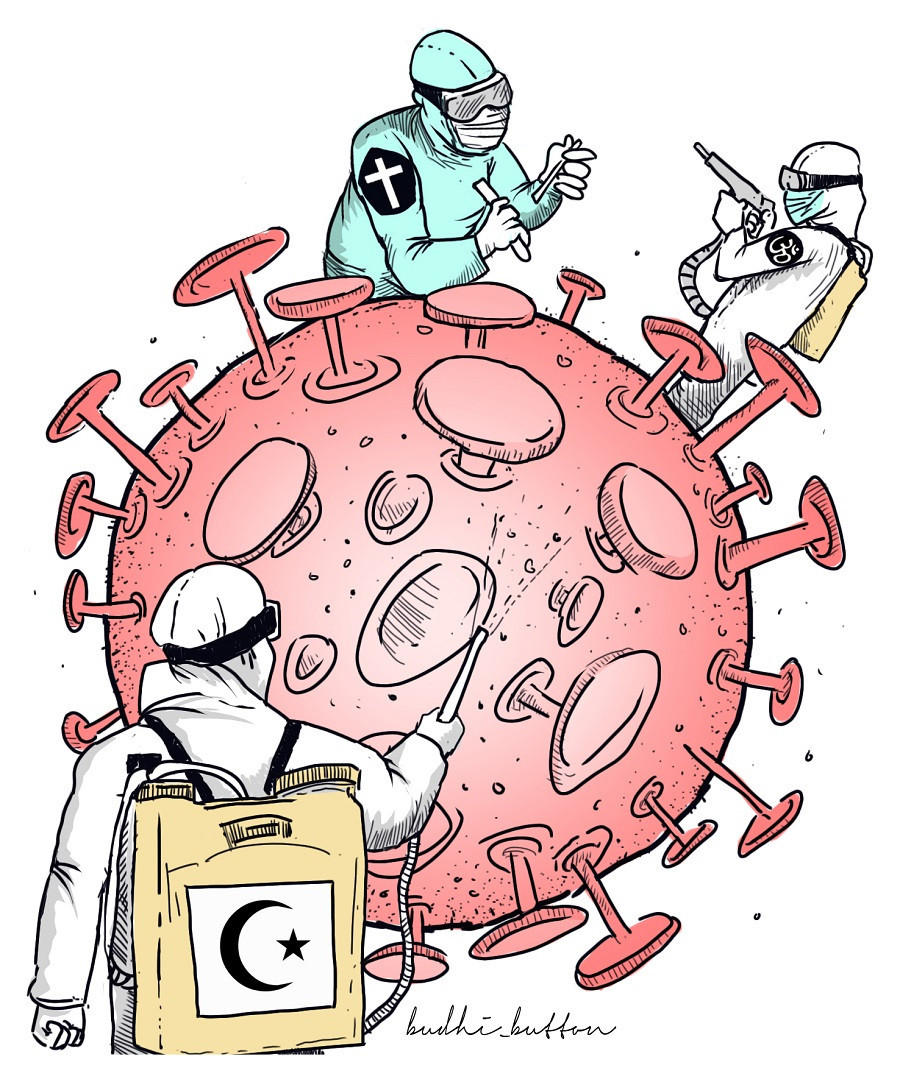Popular Reads
Top Results
Can't find what you're looking for?
View all search resultsPopular Reads
Top Results
Can't find what you're looking for?
View all search resultsReligious communities join fight against COVID-19
Though the numbers are relatively small, cases of COVID-19 were found within clusters of fundamentalist religious communities, such as members of churches in Bogor and Bandung in West Java and in the conservative Muslim group Jamaah Tabligh in West Jakarta, South Sulawesi and East Java.
Change text size
Gift Premium Articles
to Anyone
P
resident Joko “Jokowi” Widodo invited leaders of Indonesia’s religious organizations to discuss government policies for easing the COVID-19 pandemic on June. He specifically appreciated the roles and contributions of religious communities.
Within the context of a religiously diverse Indonesia, the pandemic is connected to religions. Fundamentalists argued that COVID-19 was destined to emerge and required mankind to simply seek divine protection through prayer and repentance. The pandemic is believed to be punishment from God for the sings people have committed.
On the other hand, the progressive groups hold a view that the pandemic is a consequence of human’s harmful behavior to the nature. It is a man-made disaster. According to the progressive, overcoming COVID-19 pandemic is possible through sciences, behavioral changes, medical treatment and spiritual endeavors.
My observation of COVID-19 demonstrates how religious beliefs and understanding contributes to the spread of the pandemic. Though the numbers are relatively small, cases of COVID-19 were found within clusters of fundamentalist religious communities, such as members of churches in Bogor and Bandung in West Java and in the conservative Muslim group Jamaah Tabligh in West Jakarta, South Sulawesi and East Java.
On the contrary, progressive groups have made serious efforts to contain COVID-19 transmission. They have significantly contributed to the fight against the pandemic in at least three fields.
First, they built a constructive understanding or world view of COVID-19. As theories of religions, a world view is a very central aspect or even a locus of religious behavior.
The progressive groups argue that what happens in the universe follows sunnatullah (the laws of nature) and mankind is the main actor responsible for its own deeds and the sustainability of life and nature. They do not condemn either the government or other countries as agents of COVID-19 but accept the pandemic as a reality that calls for action and solutions.
Such a view differs from that of fundamentalists who tend to blame others based on conspiracy theories.
Second, religious communities issue fatwas that are instrumental in the efforts to combat the pandemic. Most of the fatwas consist of guidance and advice for rituals and worship at home. These fatwas did not come out because of the government’s orders or intervention.
Fatwas reflect a comprehensive, deep and contextual understanding of Islam and responsibility to solve problems. COVID-19 is not exclusively the government’s duty. It is a national call for every citizen to contribute accordingly.
The pandemic is not the mistake of the government but a global disaster. It is clear how religious communities share a preventive contribution through religious public education. Compared to other public venues, places of worship are less likely to become epicenters of the virus’ spread.
Progressive religious communities also play a role as bridgebuilders between the government and fundamentalist communities who oppose physical distancing rules and the closure of places of worship like mosques and churches. The fundamentalists have claimed that shutting down mosques while opening shopping malls are deliberate attempt to promote secularization and weaken the Muslim movement.
Third, religious communities’ contribution to medical services cannot be disregarded. Having spiritual, national and social motives and responsibility, religious communities organize and serve people to save many lives from COVID-19. As part of its response to the pandemic, Muhammadiyah, the country’s largest progressive Islamic movement, set up the Muhammadiyah COVID-19 Command Center (MCCC).
Muhammadiyah has allocated more than Rp 249 billion (US$18 million) for the fight against COVID-19. More than 60,000 medical, psychological and social volunteers participated in the program, and 77 Muhammadiyah and Aisyiah hospitals have become centers for COVID-19 patients. Services Muhammadiyah is providing also include medical care, as well as psychological, social and religious consultations.
Likewise, the Indonesian Communion of Churches (PGI) formed Churches Fight Against Corona (GMC), which also serves people with aid and medical care. These are just examples of the contributions of religious communities to COVID-19 mitigation programs.
Further remarkable contributions have also come from the Humanitarian Forum of Indonesia (HFI). This interfaith humanitarian organization has participated in relief and rehabilitation programs. The HFI shows empirical evidence for how religions could unite people from different faiths to cooperate in meaningful ways.
Undeniably, there are theological differences between religions. However, there are also common religious teachings and values on humanity. It is beautiful sight when Muslims clean churches and Christians heal Muslims suffering from COVID-19.
Instead of wasting time on theological debates, this pluralist movement offers a living example of how religions become a uniting factor of people. Indonesia has a lot to share about how religious tolerance and cooperation can become social and spiritual modalities for national unity. It brings the message of the importance of strengthening religious dialogue and partnership in action.
Another message is that religious communities do not simply contribute to the battle against COVID-19 through prayers and fatwas but more importantly, these communities serve as agents of development, social health, political stability and economic sustainability.
***
The writer is secretary-general of Muhammadiyah and lecturer at Syarif Hidayatullah State Islamic University Jakarta









